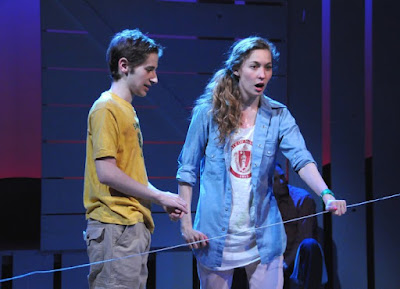Milk
If thesis papers were written by creative-writing majors, they might be read more often. Such is the case with Emily DeVoti's Milk, a cry against homogenization and pasteurization, presented as a comfortable and pleasant Reagan-era parable. At the same time, however, Milk often feels like an staged essay, a fact that's not dispelled by the novelty of having Auroch (Carolyn Baeumler)--"quite possibly the last living wild cow"--present the bullet-point themes of each scene. ("Any cow I have ever owned has quickly gained control of her letdown reflex and knowing the calf is waiting, will not let me have any milk. You may have to fight for your share of the milk, or be very clever, tactful, or gifted at subterfuge...to get it.") It's stifled a bit, too, by the mathematically logical viewpoint of its dairy farm-owning main character, Meg (Jordan Baker), at least until she starts to break loose in the second act. In spite of these flaws, the show's structure succeeds in making a convincing point--one neatly emphasized by director Jessica Bauman's deconstruction of Susan Zeeman Rogers' simple farmhouse set: without the freedom to choose--to change--we're doomed (no matter how lovely the view). ("Without choice, you're no one: a blank slate, undefined. That's what differentiates us from...animals.")
That change comes early, with the arrival of James (Peter Bradbury), a brash and cocky businessman who needs to escape the city. Playing the part of big government, with his helicopters, confusing contracts, and abundance of wealth, he inserts himself into the well-being of the dairy farm, convinced that his commercial mind is better than nature's ways. Like the snake, he tempts the family, especially Matt (Noah Robbins), showing him a world outside of Massachusetts--of great interest to a world-wanting Walkman-wearing teen--and introducing him to his daughter, Veronica (the charming Anna Kull), whose fascination with the abundant life--and death--of the farm helps Matt to see it anew. Rounding out the cast is Meg's naive husband, Ben (Jon Krupp), who gets so swept up in the sudden abundance of material goods that he loses sight of the things that matter most to him--like his wife.
Milk starts to hit its sweet spot after a Religious Moment in which James drinks raw milk for the first time. (Well, for the second time--the first time, he spits it out: "It's warm!") These accented and stylized bits, which represent internal shifts in character, are the creative juice that help to elevate the "raw" information that DeVoti has filled her play with. They also creates a dramatic shift from James's mockery of "antequainted" life to his acceptance of what can only be called the quaintessential. Now--ironically, for the set slowly begins to break into pieces--the whole comes into view, especially in the playful flirtations between Veronica and Matt.
However, it sours somewhat at the end, falling back into piecemeal form in an attempt to resolve things in a poetic tableau. James spends the last fifteen minutes milking an imaginary cow in the background, the children rush to a previously unmentioned electrical fence to connect through pain in heartbeat form, and Ben--a cipher by this point--gets left left behind, both by Meg and DeVoti. (It doesn't help that the acting is a little uneven and often exaggerated, though it's worth noting that the play is written so well that it still spins smoothly--butter-like--across the stage.) DeVoti's good intentions to show a raw, naked truth are ultimately brought down by a processed, confusing fiction.




















